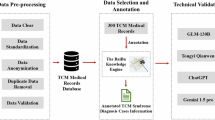Abstract
Traditional Chinese Medicine (TCM) as one of most important approach for disease treatment in China for thousands of years. Lots of experience of famous experts in TCM is recorded in medical bibliography. The first vital work for TCM doctor is to diagnose the disease by the patients’ symptoms, and then predict the syndromes which the patient has. Generally, this process reflects the medical skill of the TCM doctors. Therefore, TCM diagnose is easy to misdiagnose and difficult to master for TCM doctors. In this paper, we proposed a probabilistic model—the symptom-syndrome topic model (SSTM) to explore connected knowledge between symptoms and syndromes. In the SSTM, symptom-syndrome are modeled by generative process. Finally, we conduct the experiment on the SSTM. The results show that the SSTM is effective for mining the syndrome regularities in TCM data.
Access this chapter
Tax calculation will be finalised at checkout
Purchases are for personal use only
Preview
Unable to display preview. Download preview PDF.
Similar content being viewed by others
References
Zhang, X., Zhou, X., Huang, K., Feng, Q., Chen, S., and Liu, B.: Topic model for Chinese medicine diagnosis and prescription regularities analysis: Case on diabetes, Chinese Journal of Integrative Medicine, 17, 307 (2011)
Jiang, Z., Zhou, X., Zhang, X., and Chen, S.: Using link topic model to analyze traditional Chinese Medicine Clinical symptom-herb regularities, in IEEE International Conference on E-Health Networking, Applications and Services, pp. 15 (2012)
Zhou, X., Chen, S., Liu, B., Zhang, R., Wang, Y., Li, P., & Yan, X.: Development of traditional Chinese medicine clinical data warehouse for medical knowledge discovery and decision support, Artificial Intelligence in Medicine, 48, 139 (2010)
Zhou, X., Peng, Y., and Liu, B.:Text mining for traditional Chinese medical knowledge discovery: A survey, Journal of Biomedical Informatics, 43, 650 (2010)
Liu, C. X., and Shi, Y.: Application of data-mining technologies in analysis of clinical literature on traditional Chinese medicine, Chinese Journal of Medical Library & Information Science (2011)
Liu, B., Zhou, X., Wang, Y., Hu, J., He, L., Zhang, R., Chen, S., and Guo, Y.: Data processing and analysis in real-world traditional Chinese medicine clinical data:challenges and approaches, Statistics in Medicine, 31, 653 (2012)
Blei, D. M.: Probabilistic topic models, Communications of the ACM, 55, 77 (2012)
Thomas K. Landauer, P. W. F., Darrell Laham.:An Introduction to Latent Semantic Analysis, Discourse Processes, 25, 259 (1998)
Hofmann, T.: Probabilistic latent semantic indexing, in Proceedings of the 22nd annual international ACM SIGIR conference on Research and development in information retrieval, ACM, pp. 50 (1999)
Blei, D. M., Ng, A. Y., and Jordan, M. I.: Latent dirichlet allocation, the Journal of machine Learning research, 3, 993 (2003)
Hong, L., and Davison, B. D.: Empirical study of topic modeling in Twitter, Proceedings of the Sigkdd Workshop on Social Media Analytics, 80 (2010)
Zhao, W. X., Jiang, J., Weng, J., He, J., Lim, E. P., Yan, H., and Li, X.:Comparing Twitter and Traditional Media Using Topic Models, in In ECIR, pp. 338 (2011)
Rosen-Zvi, M., Griffiths, T., Steyvers, M., and Smyth, P., The author-topic model for authors and documents: in Proceedings of the 20th conference on Uncertainty in artificial intelligence, AUAI Press, pp. 487 (2004)
Yan, X., Guo, J., Lan, Y., and Cheng, X.: A biterm topic model for short texts, in Proceedings of the 22nd international conference on World Wide Web, International World Wide Web Conferences Steering Committee, pp. 1445 (2013)
Yi, F., Wu, Z., Zhou, X., Zhou, Z., and Fan, W.: Knowledge discovery in traditional Chinese medicine: State of the art and perspectives, Artificial Intelligence in Medicine, 38, 219 (2006)
Lukman, S., He, Y., and Hui, S. C., Computational methods for Traditional Chinese Medicine: A survey, Computer Methods & Programs in Biomedicine, 88, 283 (2007)
Wu, Z., Chen, H., and Jiang, X.: 1 – Overview of Knowledge Discovery in Traditional Chinese Medicine 1, 1 (2012)
Yao, L., Zhang, Y., Wei, B., Wang, W., Zhang, Y., and Ren, X.: Discovering treatment pattern in traditional Chinese medicine clinical cases using topic model and domain knowledge, in IEEE International Conference on Bioinformatics and Biomedicine, pp. 191 (2014)
Liang, Y., Yin, Z., Wei, B., Wei, W., Zhang, Y., Ren, X., and Bian, Y.: Discovering treatment pattern in Traditional Chinese Medicine clinical cases by exploiting supervised topic model and domain knowledge, Journal of Biomedical Informatics, 58, 425 (2015)
Heinrich, G.: Parameter estimation for text analysis, Technical Report (2004)
Chemudugunta, C., Smyth, P., Steyvers, M.: Modeling General and Specific Aspects of Documents with a Probabilistic Topic Model Vol. 19, MIT Press (2007)
Ma J, Zhang Y, Wang Z, et al.: A Message Topic Model for Multi-Grain SMS Spam Filtering. International Journal of Technology and Human Interaction (IJTHI), 2016, 12(2): 83-95
Author information
Authors and Affiliations
Corresponding author
Editor information
Editors and Affiliations
Rights and permissions
Copyright information
© 2017 Springer International Publishing AG
About this paper
Cite this paper
Ma, J., Wang, Z. (2017). Discovering Syndrome Regularities in Traditional Chinese Medicine Clinical by Topic Model. In: Xhafa, F., Barolli, L., Amato, F. (eds) Advances on P2P, Parallel, Grid, Cloud and Internet Computing. 3PGCIC 2016. Lecture Notes on Data Engineering and Communications Technologies, vol 1. Springer, Cham. https://doi.org/10.1007/978-3-319-49109-7_15
Download citation
DOI: https://doi.org/10.1007/978-3-319-49109-7_15
Published:
Publisher Name: Springer, Cham
Print ISBN: 978-3-319-49108-0
Online ISBN: 978-3-319-49109-7
eBook Packages: EngineeringEngineering (R0)




